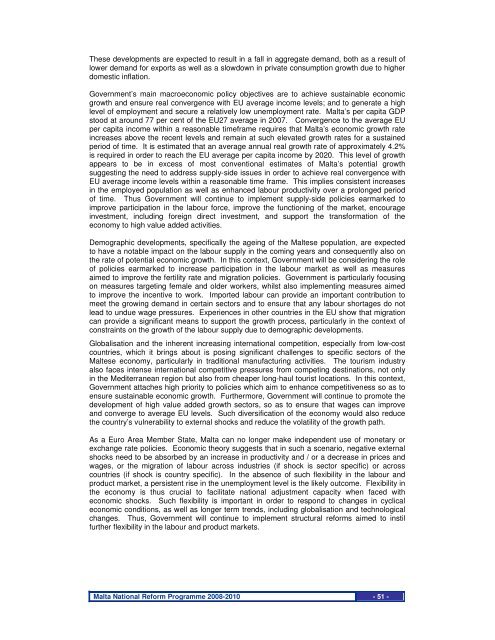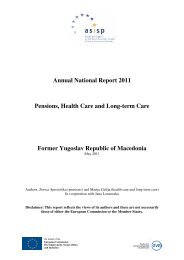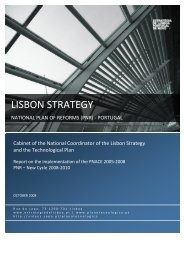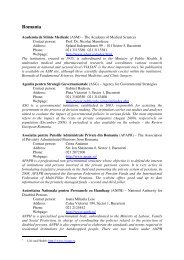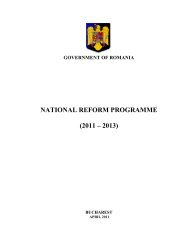National reform programme 2008-2010 Malta - European Commission
National reform programme 2008-2010 Malta - European Commission
National reform programme 2008-2010 Malta - European Commission
You also want an ePaper? Increase the reach of your titles
YUMPU automatically turns print PDFs into web optimized ePapers that Google loves.
These developments are expected to result in a fall in aggregate demand, both as a result of<br />
lower demand for exports as well as a slowdown in private consumption growth due to higher<br />
domestic inflation.<br />
Government’s main macroeconomic policy objectives are to achieve sustainable economic<br />
growth and ensure real convergence with EU average income levels; and to generate a high<br />
level of employment and secure a relatively low unemployment rate. <strong>Malta</strong>’s per capita GDP<br />
stood at around 77 per cent of the EU27 average in 2007. Convergence to the average EU<br />
per capita income within a reasonable timeframe requires that <strong>Malta</strong>’s economic growth rate<br />
increases above the recent levels and remain at such elevated growth rates for a sustained<br />
period of time. It is estimated that an average annual real growth rate of approximately 4.2%<br />
is required in order to reach the EU average per capita income by 2020. This level of growth<br />
appears to be in excess of most conventional estimates of <strong>Malta</strong>’s potential growth<br />
suggesting the need to address supply-side issues in order to achieve real convergence with<br />
EU average income levels within a reasonable time frame. This implies consistent increases<br />
in the employed population as well as enhanced labour productivity over a prolonged period<br />
of time. Thus Government will continue to implement supply-side policies earmarked to<br />
improve participation in the labour force, improve the functioning of the market, encourage<br />
investment, including foreign direct investment, and support the transformation of the<br />
economy to high value added activities.<br />
Demographic developments, specifically the ageing of the Maltese population, are expected<br />
to have a notable impact on the labour supply in the coming years and consequently also on<br />
the rate of potential economic growth. In this context, Government will be considering the role<br />
of policies earmarked to increase participation in the labour market as well as measures<br />
aimed to improve the fertility rate and migration policies. Government is particularly focusing<br />
on measures targeting female and older workers, whilst also implementing measures aimed<br />
to improve the incentive to work. Imported labour can provide an important contribution to<br />
meet the growing demand in certain sectors and to ensure that any labour shortages do not<br />
lead to undue wage pressures. Experiences in other countries in the EU show that migration<br />
can provide a significant means to support the growth process, particularly in the context of<br />
constraints on the growth of the labour supply due to demographic developments.<br />
Globalisation and the inherent increasing international competition, especially from low-cost<br />
countries, which it brings about is posing significant challenges to specific sectors of the<br />
Maltese economy, particularly in traditional manufacturing activities. The tourism industry<br />
also faces intense international competitive pressures from competing destinations, not only<br />
in the Mediterranean region but also from cheaper long-haul tourist locations. In this context,<br />
Government attaches high priority to policies which aim to enhance competitiveness so as to<br />
ensure sustainable economic growth. Furthermore, Government will continue to promote the<br />
development of high value added growth sectors, so as to ensure that wages can improve<br />
and converge to average EU levels. Such diversification of the economy would also reduce<br />
the country’s vulnerability to external shocks and reduce the volatility of the growth path.<br />
As a Euro Area Member State, <strong>Malta</strong> can no longer make independent use of monetary or<br />
exchange rate policies. Economic theory suggests that in such a scenario, negative external<br />
shocks need to be absorbed by an increase in productivity and / or a decrease in prices and<br />
wages, or the migration of labour across industries (if shock is sector specific) or across<br />
countries (if shock is country specific). In the absence of such flexibility in the labour and<br />
product market, a persistent rise in the unemployment level is the likely outcome. Flexibility in<br />
the economy is thus crucial to facilitate national adjustment capacity when faced with<br />
economic shocks. Such flexibility is important in order to respond to changes in cyclical<br />
economic conditions, as well as longer term trends, including globalisation and technological<br />
changes. Thus, Government will continue to implement structural <strong>reform</strong>s aimed to instil<br />
further flexibility in the labour and product markets.<br />
<strong>Malta</strong> <strong>National</strong> Reform Programme <strong>2008</strong>-<strong>2010</strong> - 51 -


